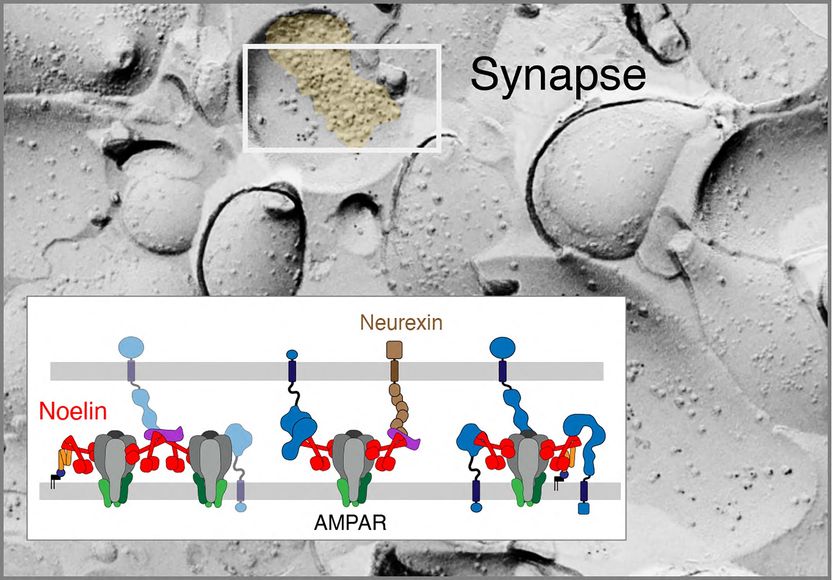Former unknowns: Noelin proteins central to learning ability of mammalian brains
German-American research team led by Freiburg physiologists reveals the fundamental importance of Noelin proteins for the plasticity of neurons
A German-American research team led by Prof. Dr. Bernd Fakler of the Medical Faculty of the University of Freiburg, has succeeded in demonstrating the central influence of Noelin1-3 proteins on the learning ability of mammalian brains. The detailed study results have been published in the journal Neuron by the publisher Cell Press . Lead authors are Dr. Sami Boudkkazi and Dr. Jochen Schwenk, both members of the Institute of Physiology in Freiburg, and Dr. Naoki Nakaya from the National Institutes of Health, Bethesda/USA.

Electron micrograph of an excitatory synapse and schematic of the protein network anchoring AMPA receptors in the cell membrane.
Bernd Fakler
Better understanding of brain processes created
At least 40 proteins are required for the assembly and function of AMPA receptors, the main transmitter receptors in the excitatory (excitatory) synapses of the brain. In the past ten years, Fakler's research group has been able to elucidate most of the tasks performed by these building blocks; however, the function of some of these building blocks was still completely unexplored. These unknowns previously included noeline1-3, a family of secreted proteins present in all vertebrates. "We studied AMPA receptors in the brains of mice in which the production of Noelin1-3 was specifically inactivated. These came from our American project partners led by Dr. Stanislav Tomarev of the National Institutes of Health, Bethesda/USA," says study leader Fakler. He summarizes the central study results as follows: "We were able to show that the noelins, as tetramers, can link the AMPA receptors with a whole series of anchor proteins such as neurexin1 or neuritin1 and thus stabilize them in the cell membrane. Noeline1-3 are thus responsible for maintaining the activity-dependent synaptic plasticity of neurons: they act, so to speak, as "universal anchors" that control the distribution and dynamics of AMPA receptors in the brain."
These research results not only allow the conclusion that synapses with a critical Noelin deficiency are hardly capable of learning. If the secretory proteins produced in the brain are missing, it also negatively affects the function and morphology of neurons in the long term. "Our work shows that the complexity of neurons decreases and some functions are no longer guaranteed. What consequences this development may have for higher brain functions remains to be seen," Fakler says.
Findings fundamental for basic research in other disciplines
The results of the international research team cannot be applied across the board to the human brain, Fakler says. "However, we suspect that there is almost a 1:1 correlate to humans in glutamate receptors. So I'm optimistic that our novel findings on how Noelin proteins act in the brain can also contribute to basic research in humans." In addition, scientists from other disciplines could use the study results to explain, for example, the more or less high degree of plasticity of neurons or to draw conclusions about neural networks and their information processing.
Note: This article has been translated using a computer system without human intervention. LUMITOS offers these automatic translations to present a wider range of current news. Since this article has been translated with automatic translation, it is possible that it contains errors in vocabulary, syntax or grammar. The original article in German can be found here.
Original publication
Sami Boudkkazi, Jochen Schwenk, Naoki Nakaya, Aline Brechet, Astrid Kollewe, Harumi Harada, Wolfgang Bildl, Akos Kulik, Lijin Dong, Afia Sultana, Gerd Zolles, Uwe Schulte, Stanislav Tomarev, Bernd Fakler; "A Noelin-organized extracellular network of proteins required for constitutive and context-dependent anchoring of AMPA-receptors. "; Neuron (2023).




















































